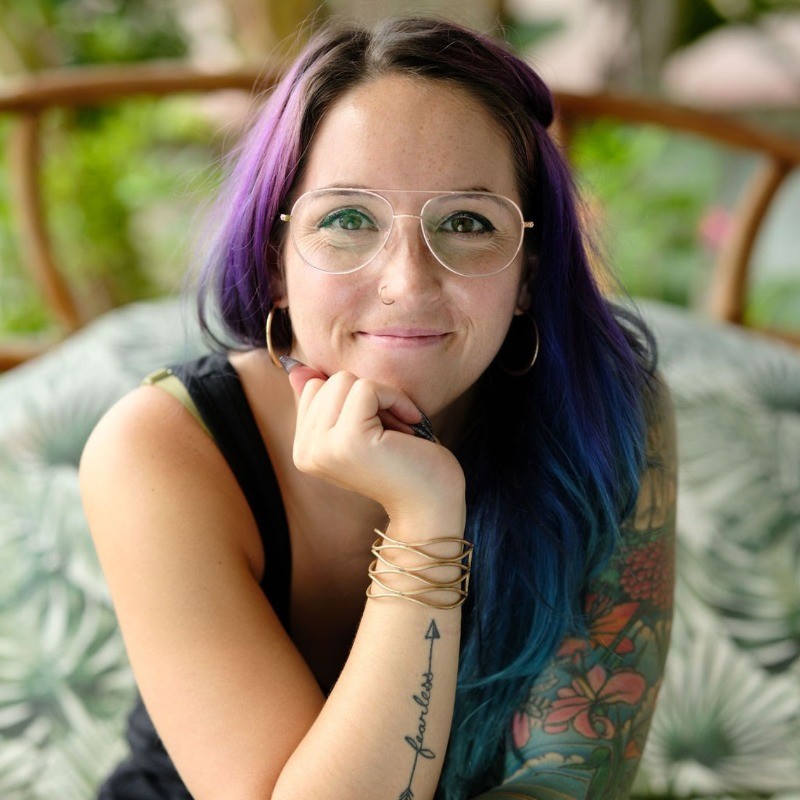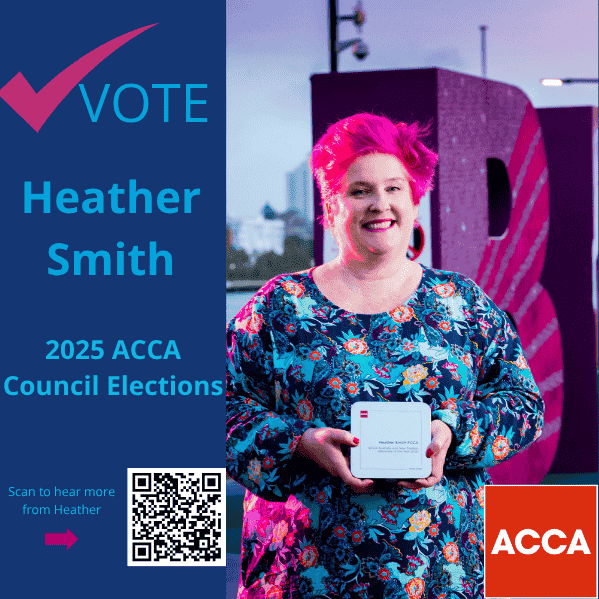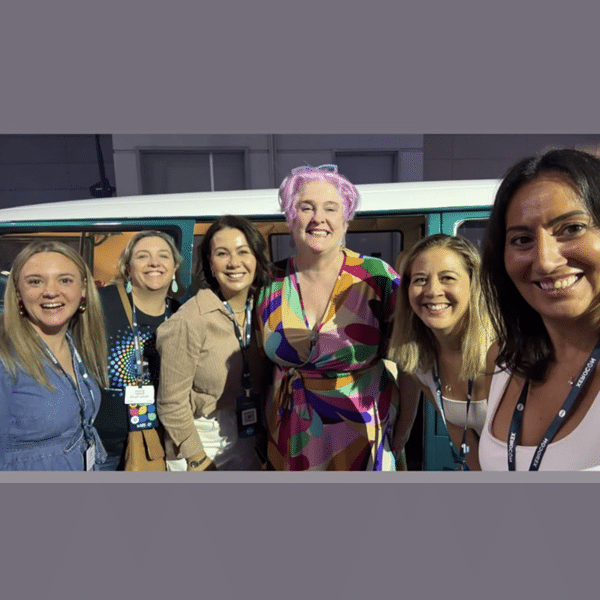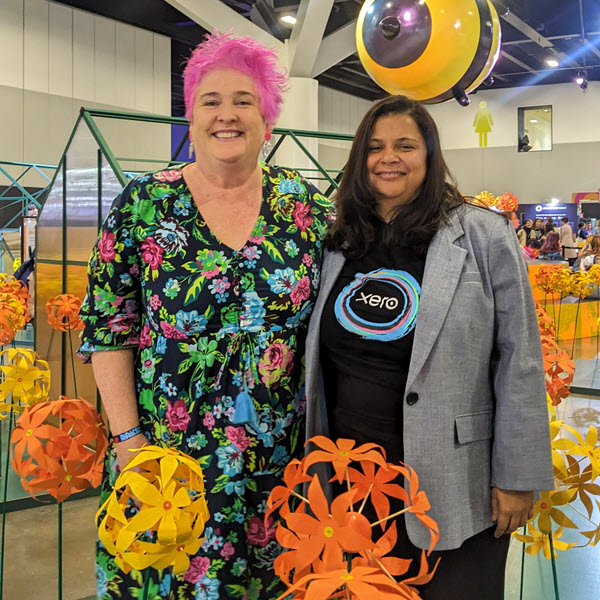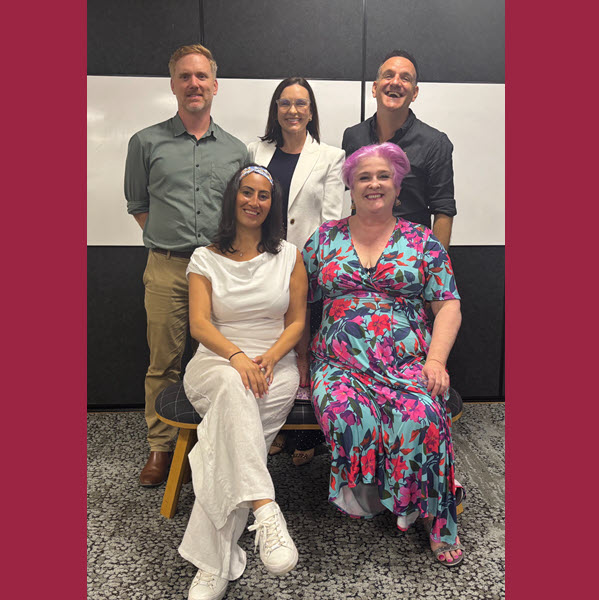“The really successful communities are the ones where people really understand that the more you give, the more you get. And so I think of it as like ask and answer.” – Alison Ball
Today I’m speaking with Alison Ball Director of Marketing and Influencer Strategy for Liscio, Inc. In this episode, we talk about . . .
- Her new role at a category breaking app Liscio
- Designing Customer Experience 2.0
- Building and Growing a Community
- Influencer Marketing and activities one can undertake to be an ‘influential thought leaders’
- The concepts of Hive Mind and Adjacent Possibility
- As well as exploring all things around community building and influencer marketing
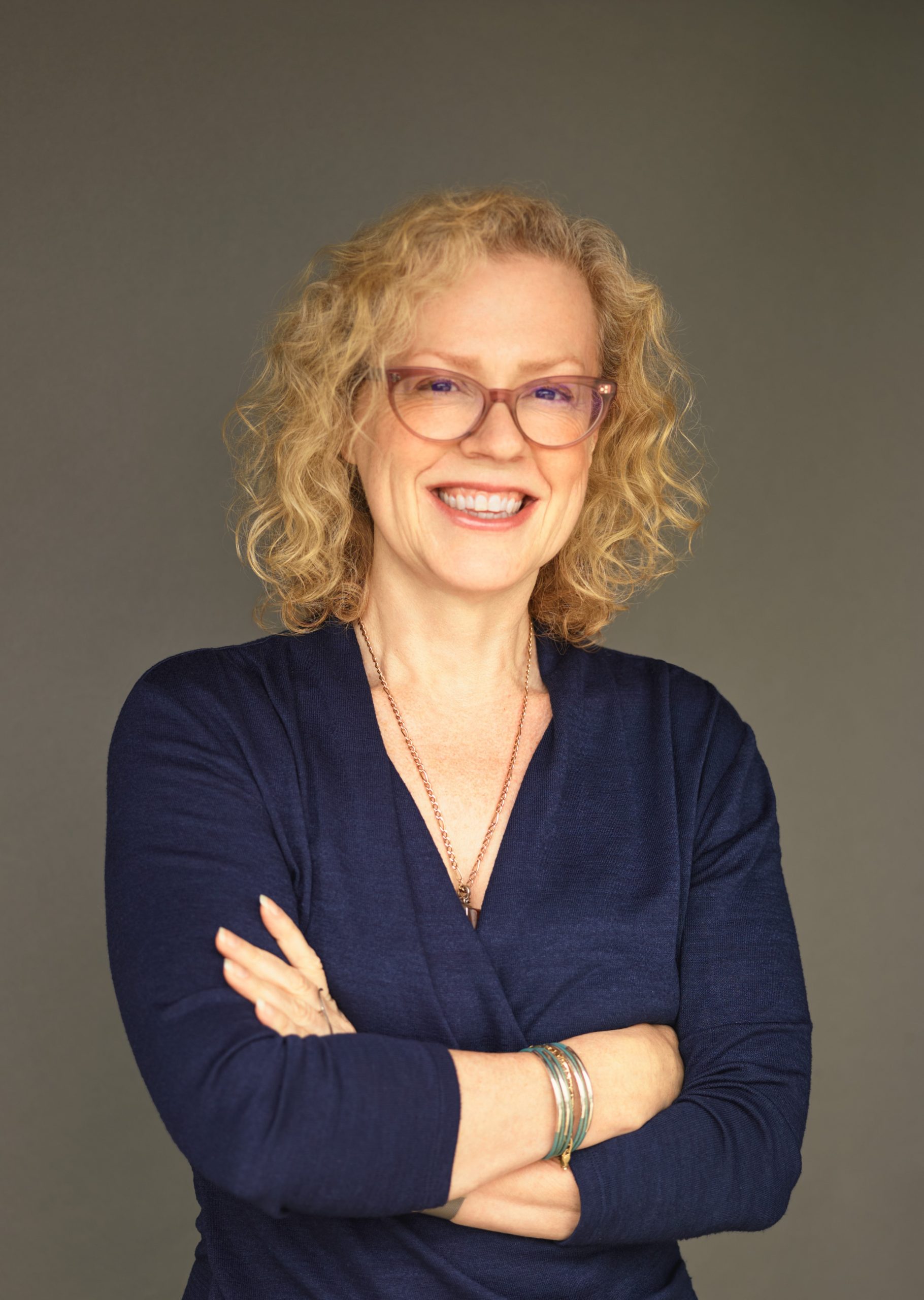
Alison, what would you tell your 12-year-old self?
Alison Ball: Oh gosh, what would I tell my 12-year-old self? Okay, so I was a really awkward 12-year-old. Oh my gosh, I hadn’t grown yet, I was really scrawny and really
small. I was that kid that got put in garbage cans, in rubbish bins with the bum first kind of thing. Locked in lockers, all that kind of stuff. I would tell my 12-year-old self that being unique, being out of the ordinary is going to turn around and be a really good thing. That’s
what I would tell. I probably was 35 before I realised that. It was a long journey. So if we can raise our kids now to be okay being “weird” or being unique, and also tell our own inner selves that it’s really okay to be who we are, that would be what I would say.
Heather Smith: Absolutely.
Alison Ball: It’s a version of it gets better.
Heather Smith: Yeah.
Alison Ball: Things get better.
Heather Smith: I hope you really weren’t put in lockers.
Alison Ball: I was, I was put in lockers. I was really small. And also, I was mouthy, and I was two years ahead, so when I w
as 12 I was in with 14-year-olds, so you can just imagine. It was this perfect storm. I don’t want everybody to feel sorry for me because I had all kinds of things going for me, but 12 was a challenging year.
Heather Smith: Yeah, well I’m pretty sure that the rest of the world thought those American high school dramas where people were put in lockers were not real.
Alison Ball: Oh no, this was Canada. This was Canada.
Heather Smith: Oh, this is Canada.
Alison Ball: And it happens even there. No, it does, it does yes and I was at a British private school and all of that, oh yeah.
Heather Smith: Oh goodness, goodness me.
Alison Ball: So I think this happens all over the world actually. Kids are mean.
Heather Smith: Whereabouts in Canada, can I ask?
Alison Ball: Yeah, so I’m basically, what I describe myself as a West Coast girl. Really only lived on the West Coast, so it was in Victoria, British Columbia.
Heather Smith: Okay, thank you for that.
Alison Ball: Lovely, lovely place, yeah, yeah.
Alison, you describe yourself as a silver lining kind of person. What’s been your silver lining for 2020?
Alison Ball: Oh, oh so many. So I need to back up just a little bit Heather.
Heather Smith: Mm-hmm.
Alison Ball: When I talk about silver lining what I mean is that there’s always a gift in any experience, and even the experience, as long as you’re not being really horribly physically or mentally abused, that’s a totally different category of experience, but let’s just say normal life, the normal things that happen to people, their normal challenges. There’s always something that you learn. And that learning, as long as you can focus your attention on what you learned and take that forward into your life, you just suddenly start seeing these adversities a little differently. It doesn’t happen overnight and I’m not saying that everybody should say, “Oh good, a terrible experience. What am I going to learn?” No, no, you go through the experience and it’s awful at the time, but when you come through the other end, if you can realise what the gift was and what you learned, and sometimes these gifts are legion, they are huge.
Alison Ball: I would say that the big thing for me with 2020 is the Black Lives Matter movement. The fact that people like myself, who never considered, I would never, ever have considered myself racist, in fact, I would have said I was an anti-racist. However, I did not realise how just the act of just being a different colour… Well not even a different colour, just not white. I didn’t want to say different because that puts a value judgement on it. What I want to say is just not being white, how much more challenging your life is. And until we change those systemic things, that are just as I said, systemic, then we can’t really move forward as a society. So the fact that that conversation is not only started but is really everyone’s talking about it
and it’s really starting to be very, very real. We’re never going back.
Alison Ball: It’s like a couple of years ago the Me Too movement. Women are never going to ever be treated the w
ay they were before. We simply will not stand for it, and so we’re going to get to that point where we simply will not stand for racial inequity or injustice of any kind. And so that’s coming. We’re not there yet. We’re not even close to being there but those conversations have started and they’ve started in real… And that’s what we get.
Heather Smith: Absolutely.
Alison Ball: Then I would say the other one for… And this is, boy this is a double-edged sword here, is that we are now aware that we cannot ignore climate change. I mean you look at what happened in Australia with the fires. We’re having that right now in California. I had a real experience last week of knowing what it would be like to have nuclear winter, literally no sun. So these things are big and I think we’ve been woken up, I think that’s the big gift.
Heather Smith: The odd thing is, due to what’s happened a lot of us have had some time to have some really big thoughts around it. Unfortunately, the conversations have started around that and I’m very much aligned to all of your thoughts on that. The big issues came out…
Alison Ball: Sorry, I really didn’t mean to get political, I just was thinking…
Heather Smith: No, I don’t think it’s political.
Alison Ball: Well, 2020. We’re going to look back, and we’re going to say, “That was the year.” We’re living through
history right now.
Heather Smith: Absolutely, absolutely agree with you, everything that you said there, and really hope that the momentum can keep going and the conversations can keep happening and the listening can keep happening. Interestingly enough, I sat on a session yesterday and it was these two gentlemen who run a really proactive accounting firm. They said the biggest impact on them was that they actually took an active listening course. And I was like…
Alison Ball: Oh that’s fantastic, good on them.
Heather Smith: Yeah, I was like, “Wow,” and so this mind bomb is about wow, active listening. Yeah, this is something good and we can actually do a course on it.
Alison Ball: That would be a great topic for you for another… Get those guys on and ask them what they learned.
Heather Smith: Yeah, no absolutely.
Alison Ball: Life before, life after.
Heather Smith: Yeah.
Alison Ball: Right?
Can you share a bit about your background Alison?
Alison Ball: Yeah, oh I’m happy to. So depending on who you talk to I’m either an accountant, a recovering accountant I usually like to say, or I am an influencer, marketing influencer, management, or I’m marketing. If you knew me on Instagram you would think I was a farmer because it’s all about my little urban farm. So I have obviously, like everybody, different facets. But I think the tie that binds me all the way through there is that I really love to actually help people and a really happy day for me is when I can help someone else be more successful. And I get very fascinated with the relationships that people have and how you can reach one person and that person then can reach many.
Alison Ball: Educating people, training people, finding ways to… I know we’re going to be talking about community, finding ways to see discussions and lead communities, create communities, connect people. There’s this thread all the way through that people are better together, and it takes a rare person that can really go it alone. But history-wise, I just finished 15 years at Intuit, which was shocking that I would be anywhere for 15 years. But there you go, it flew. They kept giving me fun things, and now I’m at Liscio, which is a category breaking app that I think it defies description because we’re creating client experience 2.0 for accountants to give their clients. And the concept is that accountants and bookkeepers need to securely exchange sensitive data with their clients obviously. However, the clients are out, they’re busy, they’re mobile, they don’t want to be doing it back at their office with clunky portals and things.
Alison Ball: So Liscio is kind of like this home base really for clients and accountants and bookkeepers to securely exchange all of the different things that they have to exchange in a really delightful way. And so it was a big change to go from a big company to a very small company. However, I just can tell you two and a half weeks in, I’m absolutely loving it. It’s like I get to do all the things I used to do, and create all of the… what’s sexy about the product, how do we go to market. So it’s exciting.
Heather Smith: There were so many things I loved about that. First of all category breaking, which I think possibly you and I both come across occasionally these category breaking things, and it’s like it’s really good, I just don’t even know how to describe it to you, but you need this.
Alison Ball: Yeah. Yeah, you kind of know it when you see it. It’s like you go, “Oh wow. That’s cool.”
Heather Smith: Yeah.
Alison Ball: Yeah, and then you start thinking well I could use it for this or I could use it for that, and so those are the kinds of conversations that we’re having. It’s one of these things where if we can get in front of people they sign up. It’s just the searches that people are doing. If you searched secure document storage we wouldn’t show up because that’s not the only thing we do, right?
Heather Smith: Yes.
Alison Ball: Or if you searched integrated e-signature, well we wouldn’t show up. So it’s kind of like we’re the best-kept secret. So it’s a new category, it’s a new category and I think what’s going to happen is, the accountants and bookkeepers, especially since we’re all having to work remotely. There are joys and stresses with that. I know some people bristle at this word, but I think this is the new normal. I don’t think we’re going to be going back anytime soon. Now obviously the parents who are working at home with little kids and homeschooling they’ve got big challenges, so there’s got to be some support and some change there. But for people like myself who have grown kids and they’re out and I’m working, what I need is I need that face to face like I’m having with you right now. Just that human touch. As long as I get that then I’m really happy to work at home. However, you need the systems in place to facilitate that.
Heather Smith: Yeah, absolutely, absolutely. I’m not going to touch a portal to use Liscio.
Alison Ball: You won’t touch a portal no, no.
Heather Smith: That’s good.
Alison Ball: And neither will your clients, yeah.
Heather Smith: I was running around this morning saying, “I wish people would stop inviting me to portals because I just invited-
Alison Ball: Have you found one that you like? If you have I’d like to see it because I haven’t found any that I like, yeah.
Heather Smith: I’m just getting invited to so many portals, and each one slightly changes the settings on my computer, and then I go into the next one and I have to reset to get into it, and I’m just, “Stop inviting me into portals. Can’t we find a better way to do this?”
Alison Ball: It’s really old technology, yeah, yeah. It’s client experience 1.0. It’s not even 1.0, I think it’s about .75. Right?
Does Liscio work globally at the moment?
Alison Ball: Not yet, no. Well, it just depends on the data laws. The data is stored at the moment in the US, so if your country doesn’t care about that then you’re fine with that, but if your country does then yeah.
Heather Smith: A lot of the things are actually allowed to be stored in the US because I have looked into this. However, for people listening in I’m not an expert but I have looked into it. The reasoning is that the US has sensible laws around data, so a lot of the countries don’t have a problem with it being stored there. Of course, I don’t know about different countries and different laws but that’ll be interesting to explore it.
Alison Ball: Yeah.
Please share a bit more about your background. What is your experience in accounting? Have you previously worked as an accountant?
Alison Ball: Not as a CPA, but I did work at an accounting firm before I came to Intuit.
Heather Smith: Oh okay.
Alison Ball: And actually wrote the help system for what is now Sage Intacct, so that’s kind of a quaint little who knew kind of factor, right? They needed an accountant to write it because the engineers had written it and it was really terrible. It was really bad. It was like this doesn’t make sense. You’re trying to sell to accountants, this doesn’t make sense. So that was really fun. That was the first high tech job I had was working at.
Heather Smith: And we’re an accounting community and an accounting profession and there’s a lot of different jobs because I’m not a CPA. I’ve got other things, but many people who will be listening will not be CPAs. I think that’s US-centric thing, but yeah.
You are a community leader in many worlds: in the accounting and business worlds, as well as in many others. How would you define the concept of community?
Alison Ball: In order to be a community I think it needs to have people that have respect and a shared interest. It’s very difficult to have a community. If the experience is bad people don’t want to stay. If there’s not respect and rules, people won’t stay. There’s to be some form of engagement where people agree to a minimum level of behavioural standards, and then they usually congregate around a certain topic. And the really successful communities are the ones where people really understand that the more you give, the more you get. And so I think of it as like ask and answer. Fine to ask questions, however when you see someone struggling and you know the answer you should…It’s kind of like all boats rise.
Alison Ball: If you think about a church, a church can be a community. Usually is the most in-person community you’ll have would be a church or the school that your kids go to would be a community. You might have a networking group that would be your community. You definitely have your close girlfriends that would be a community. You have your family, your family is a community. But when you’re talking about… What I’ve dealt with mainly at Intuit and then now I’ll be continuing that work. I mainly dealt with the people who led the communities and they would create these nice communities.
Alison Ball: So these niche communities are these specialised places where people can get the… It’s like the hive mind, I’ve heard people use that word, hive mind. Can you tell me the answer to this issue where I’m struggling with this? So I think there are some concepts of learning, there are concepts of sharing, and there’s definitely this concept of congregating around a central topic and then agreeing to give.
Heather Smith: I love that.
Alison Ball: That’s how I think of communities, and they can be in person, they can be online. The ones that I mainly interact with right now are LinkedIn and Facebook. However, Twitter is a giant community where you can talk to anybody if you want.
Heather Smith: Yeah, yeah and it very much has erupted through what has happened during COVID-19, the communities, and I think I’ve seen a few brawl pits.
Alison Ball: They get that shocked look, they go, “Wow.” I don’t think there’s actually anything more embarrassing than seeing two people duke it out on social.
Heather Smith: No, oh totally agree.
Alison Ball: I think it demeans everybody, you can-
Heather Smith: I’m just like pull away from that, pull away from that.
Alison Ball: Yeah.
How were you as a child and youth, impacted by the community around you?
Alison Ball: So I’ve told you that sorry story of when I was 12 and went to boarding school, but prior to that I lived in a farming community. That’s probably where I have my love of growing veg. I really do actually. I discovered that late in life and it is a wonderful hobby. I know Clayton Oates’s mom is also a farmer and we share that love. But the farming community would come together and help each other at times when it was needed. So if somebody didn’t have the equipment, someone else would bring over the equipment and do it for them and everybody would work together and they’d figured out this way to sort of split the alfalfa or whatever. My father had 75 acres of alfalfa, we had no equipment at all and he made these deals with these farmers that would come along with these big combines and they would take half the hay and deliver the other half into our barn.
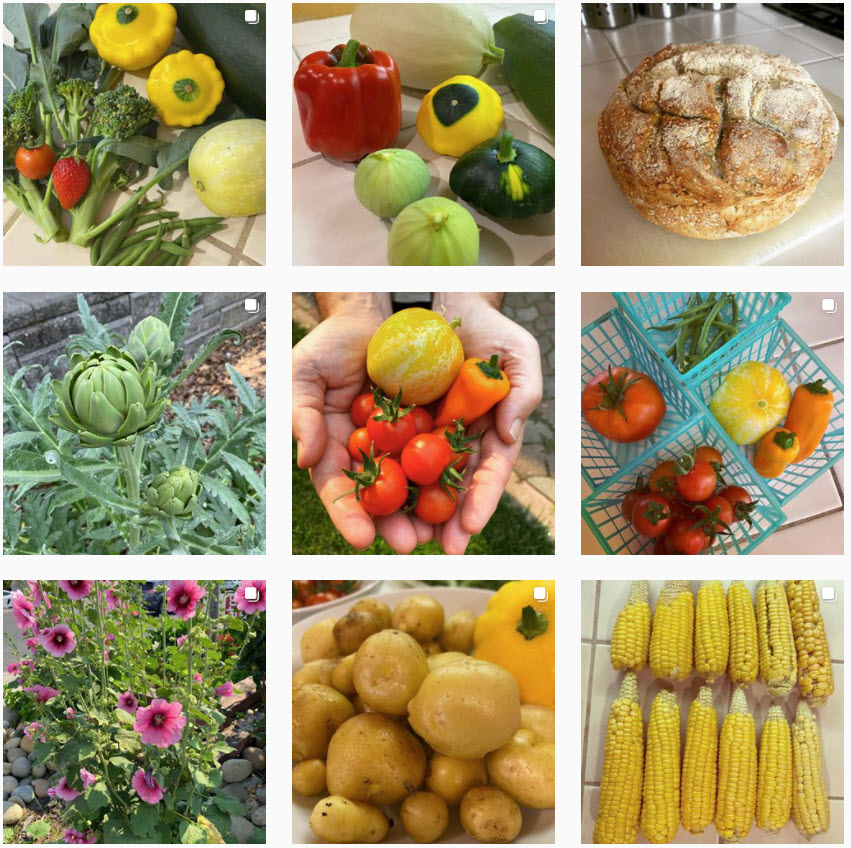
An insight into one of Alison’s most-loved hobbies – growing vegs!
Heather Smith: Alfalfa’s that really tiny, tiny thing?
Alison Ball: No, alfalfa grows pretty tall.
Heather Smith: Oh does it?
Alison Ball: Yeah. Oh, you’re thinking of sprouts. Yeah.
Heather Smith: Okay.
Alison Ball: No, when it actually grows to a plant it’s pretty big and they make it into hay, what I call a hay bale but it’s not, it’s an alfalfa bale. And it’s feed for your animals in the winter. But that was probably my earliest sense of community was going to these big events where everybody was going to help somebody do something. And building a barn, whatever. We weren’t Amish or anything like that, and there was no real obligation. It was just somebody would say, “Hey, we’re going to be doing this thing and does anybody want to join?” And people would show up and help, knowing that when their time came along people would… So when I bought my first house, fast forward many years later when I bought my first house, we created the homeowners’ consortium. And it was based on a bunch of us, we were all in our 20s and we’d all just bought our first house. And it was like okay, Alison. At the time I was married to Cameron, my son’s father. Alison and Cameron are building their deck, come along and we’ll build the deck.
Alison Ball: And so we did that and then we went and we painted Jack and Nancy’s house, and then we went and we landscaped Joe’s and Sue’s front yard. There were all these projects that we did, and so I realised that my family bonded when we were doing things. And usually, we were doing things to help other people. And so my earliest memories of the community are always around that concept of that shared goal of this sort of shared definition of success and then helping everybody. And just having a lot of fun doing it.
Heather Smith: Yeah, I actually had just spent a long time listening to Michelle Obama and your stories are just sounding like they could be coming out of Michelle Obama’s mouth.
Alison Ball: I love her. I love her. I did read her book. I’ll have to think about what story I just told where it was similar but I know that she and her family…
Heather Smith: She’s got a new podcast out.
Alison Ball: Oh a podcast okay. Yeah, yeah wonderful.
One caption of Alison Ball and Heather Smith for this episode for Cloud Stories on Communities and Marketing
Heather Smith: But that whole it makes you feel good to be able to help people, and sometimes the person who needs the help unfortunately sometimes won’t take it and you’re like… I’m always like, “When you’re ready you’ll be able to help me, but just let me help you now because I need to be able to help you get through this.”
Alison Ball: Mm-hmm, yeah there’s a pride thing that some people feel that it’s a sign of weakness to ask for help. Yeah, that’s sad. I hope that we get to the point where people feel okay saying, “I need help.”
Heather Smith: Yeah.
Alison Ball: Or at least recognising when they do, right? You can do it in a safe way. Doesn’t have to be always laying your heart out in front of 3,000 of your closest friends. It doesn’t have to be that, right?
Heather Smith: I’ve been actively sending tea to people who I just want to help them get through 10 minutes of the day.
Alison Ball: How lovely.
Heather Smith: Everyone’s distant so it’s not like I can go and paint something for them but I’m like okay, maybe this cup of tea, 10 minutes in the morning will just give you some peace.
Alison Ball: How wonderful to do that. I think I’m going to start doing that. I think that’s a fantastic idea, send somebody some tea.
Heather Smith: Yeah, tea can solve a lot of problems.
Alison Ball: Definitely.
Now that you’ve moved into a new role, how you go about building and growing a community? Do you have any fresh thoughts on building and growing a community for our audience listening, both accountants and bookkeepers and also other people in the ecosystem?
Alison Ball: Yeah, so right now I’m learning a lot, just learning really a lot about the particular issues and challenges that our customers face. So I think the deeper you go on walking in your customer’s shoes. I tend to do that quite naturally Heather because I’m an empath. That has a shadow side for sure. Oh, it does. It enables me very easy to walk deeply in the customer’s shoes and understand their pain. However, I also carry their pain and want to solve their pain and I own their pain and I feel responsible for their pain. I go too far, so I have to learn that healthy balance.
Alison Ball: But to create a community I actually may not create… It could be that I will not create a community around the product that I represent now. I may create a community around the big important problem, the customer service aspect, client service, and the challenges that accountants and bookkeepers have with providing excellent client service. We talk about advisory, we talk about value pricing, we talk about your tech stack and everything. What somehow got lost in that discussion, and this is why I really truly believe that Liscio is category breaking is that nobody really sat down and said, “What does that look like from the client-side?” And so I think right now, I think for the next three to six months I’m just going to be going very deep on the problem and understanding how people are solving it now. Getting a lot of inputs into… So I’ll start building the community with a lot of inputs on how do you define excellent client experience? What is your top tip?
Alison Ball: In fact, I’m right now assembling an ebook with just my gang of people. I put an email out there saying, “Hey, anybody want to join my gang?” I didn’t actually at that point, I didn’t actually know where I was going but I knew I needed my gang with me, my community, my people.
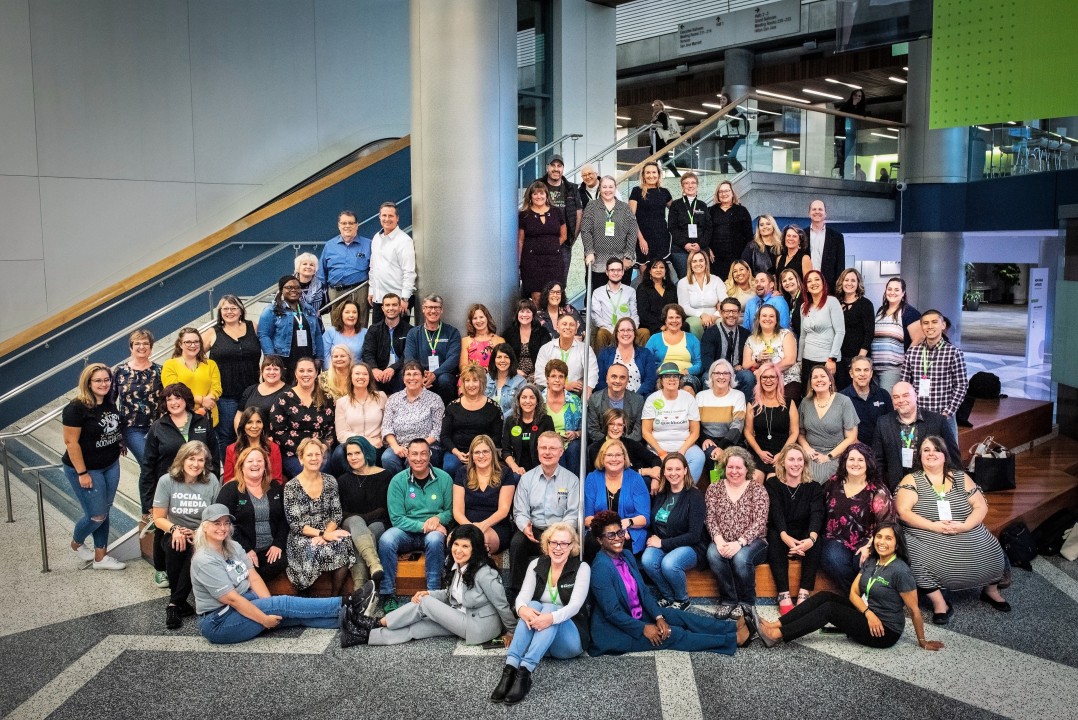
A gathering with some of TWN Members at QuickBooks Connect, San Jose 2019
Because you’ve used the word client a lot, who are Liscio’s clients?
Alison Ball: Yeah, yeah, so we’ve got CPAs, we’ve got bookkeepers, we’ve got lawyers, and we’ve got high net, worth advisors. So it’s truly anybody…
Heather Smith: It is people in professional services.
Alison Ball: Yes. People with clients that need to securely and easily exchange sensitive data.
Heather Smith: Okay.
Alison Ball: But it could work with architects, it could work with all sorts of really anybody who needs to send documents back and forth and make it easy, but do it in a way that… There’s more than that. As I said, it’s not just a portal.
Heather Smith: It is a wonderful client experience, yeah absolutely.
Alison Ball: Yeah, yeah.
What challenges have you encountered building communities and how have you dealt with them?
Alison Ball: So to build a community on your own it takes a lot of commitment because you have to care and feed it. So the people that create communities are very, very special. What I tended to do was I would create communities around communities and I know that sounds very odd, but I would connect people who had communities already created or I would connect people who could provide services and thought leadership and expertise to the communities. So my role was really just in saying, “Well this person has some great content and would be a really great guest host for your, fill in the blank here, community.”
Alison Ball: And so connecting for me was my best role. The only community that I set out to create from scratch actually took me 15 years to create. It did, and that was the Trainer/Writer Network for Intuit. And that is the single thing, other than my son because he’s fabulous and amazing and I could talk about him all day long. That is the single biggest accomplishment I think of my professional career was the Trainer/Writer Network. Because that is a group of people that are dedicated to a single cause of educating, teaching, and speaking about pretty much about just QuickBooks online and doing it globally.
Heather Smith: Yeah.
Alison Ball: And they do that to give. They are just a group of giving, smart, experts, and then fighting the adventures for them within was amazing. That was so much fun. That was like I couldn’t believe I got paid to do that.
Heather Smith: And such an important impact on the small business community beyond because all education around financial literacy is just so important for our community. You should definitely feel very proud of that because I’m sure it’s helped people you probably will never know about.
Alison Ball: Yeah, the reach. The reach is immense. Again, that one to many, so if you’re going to build a community one by one that’s great, you’re going to at some point hit your scale, you’re going to need help.
Heather Smith: Yeah.
Alison Ball: Right. And again, communities can be very small and very insular and really, really, really super supportive. Or you can start getting bigger and bigger and then you have the issues of just kind of, as I said, caring and feeding it.
Heather Smith: Yeah, absolutely and I think for people-
Alison Ball: So that’s a challenge, yeah.
Heather Smith: I think for people listening in, it’s important for me and I think Alison possibly will agree with this, it’s the quality and you may have a small five-person community and that’s completely fine and it may verge into 20, and then you might have a 2,000 or 20,000. All of those communities have value and can do stuff. If you’re listening in practice with five or nurture five if that’s where you want to start.
Alison Ball: Exactly, yep.
Heather Smith: So we’re going through challenging times now and things have become a little unrattled.
What advice would you have for someone who’s finding their community?
Alison Ball: Yeah, so I’m going to go back to a farming metaphor. If there was a sick animal in the herd you really had to get it out of the herd. You had to because it was going to take down the rest. We had sheep and so there were some diseases that sheep would get that were really, really contagious, and so at the first bit of it we would okay, whoop action, and then there was this quarantining. So I think the same kinds of things, if you start to see behaviours that aren’t accretive to the benefit of the community, usually I like to have a quiet word with the person that’s not… But privately, we don’t shame anybody, name or shame.
Alison Ball: But that said if it persists and the community owner should be, especially if it’s an online community, should feel entirely empowered to remove the person that is causing this. Because usually it’s somebody who’s being antagonistic and isn’t adhering to the rules that the community has set. And they agreed to the rules, there’s usually some form of rules when you join a community, some form of expectations, and that’s actually a tip. If you don’t have those in place for your community, it’s a good idea to put them in place.
Heather Smith: Yeah, absolutely. Look, I completely agree with that and I will highlight to listeners that I know that I’ve taken people aside and they were like, “Oh, when I put that up there I didn’t realise I’d phrased it like that.” Because what I’ll sometimes do is how about you phrase it like this so you’re not attacking that person. They’re like, “Oh, I didn’t realise that. I just wrote it in a hurry. Of course yes, I’ll go back and edit it.” And they go back and edit it and they just have-
Alison Ball: Much better.
Heather Smith: … a bit of thought around it, what they’ve said rather than throwing petrol on a flame.
Alison Ball: Right, so we need… In any community, we need people like yourself, Heather who have the want of a better word, just the wisdom just to say, “How does that look? What are the optics of what that person just said? How does it look? How many different ways could you interpret that?” And that’s a skill that not everybody has. So when you have a community, that concept of it takes a village and people have different roles really comes into play. You may have somebody who is the person who is creating the content and creating a sort of engagement for the community sort of to discuss. You may also have someone else who’s sort of the mentor and what you just described to me is someone who is the mentor and who says, “Hey, hey Alison, that comment, that was really incendiary for these reasons. I’m sure you didn’t mean it that way, however, look what happened.” And so just that education, that mentoring is super important as well.
Heather Smith: Yeah.
Alison Ball: And the more people you have like you, in a community, the better it runs.
Heather Smith: Yeah, yeah. Yes, yeah, and you’re completely right. Everyone has their different hats and has their different colours and perspectives to bring to the community and that’s what makes it such an interesting place to rise all of our boats. And a little bit of controversy’s not a problem, we just don’t want it to be toxic.
Alison Ball: No yeah, there’s respectful, right?
Heather Smith: Yeah.
Alison Ball: There’s respectful. Respectful dialogue always, respectful, diverse thoughts always, always, always welcome, that makes everybody better.
Heather Smith: Yeah.
Alison Ball: When it goes into attacking-
Heather Smith: Yeah, absolutely.
Alison Ball: It’s not.
Heather Smith: At the start of 2020, before the bush fires, I said, “Okay, 2020 is going to be the year that I’m going to listen to people with different opinions other than myself and try to understand them.” Probably wasn’t the year to do that but anyway.
Alison Ball: You had your job cut out for you, didn’t you, with this year. Oh my goodness.
Heather Smith: But I’m really trying to… Like if someone puts up something I’m like, “Can you give me a reputable source that I can read that backs up your argument,” and if they can I will read it.
Alison Ball: Yeah, it’s like, “Tell me more.” It’s like, “Well tell me more about that, or I’m curious.” If you open a sentence with tell me more or I’m curious.
Heather Smith: Yes, yes, yes.
Alison Ball: That person will tell you more.
Heather Smith: In fact, Elvira asked what was your superpower yesterday on their top 100 and I said… I’m pretty sure I said, “Curiosity.”
Alison Ball: That’s a fantastic superpower.
Heather Smith: Yeah.
Alison Ball: It’s a fantastic one, yeah.
Let’s switch lanes and talk about the concept of influencer marketing, how do you define influencer marketing?
Alison Ball: So it’s really hilarious because what I realised in my job search, Heather, was that I was doing influencer marketing before that was even a word. What we realised was, when we put a smart intelligent peer on stage and gave them great materials to use and then let them go, they would influence the audience to do what we wanted them to do, which at the time was to adopt QuickBooks. And it was done in such a delightful way that people were like, “Wow, I learned so much.” So the whole concept of educating using the power of the peer, we called it the power of the peer. Having our customers write our content for us with kind of our outlines, and then obviously we paid them for that. So there was this concept, but what most people think of influencer marketing is they think of B to C, business to consumer. And so they think, “Oh, you know I’ve got this lip gloss and I love this lip gloss-
Heather Smith: Oh my God, I have that on my table as well.
Alison Ball: Burt’s Bees, it is my favourite.
Heather Smith: I think I just need to get another one.
Alison Ball: I know, it’s my favourite and I love this colour peony. So imagine that I’m a B to C. I would say, “I love this lip gloss,” and then I put out this post and everybody buys the lip gloss. That is not what B to B influencer marketing is, which is what we’re talking about.
Heather Smith: Yeah.
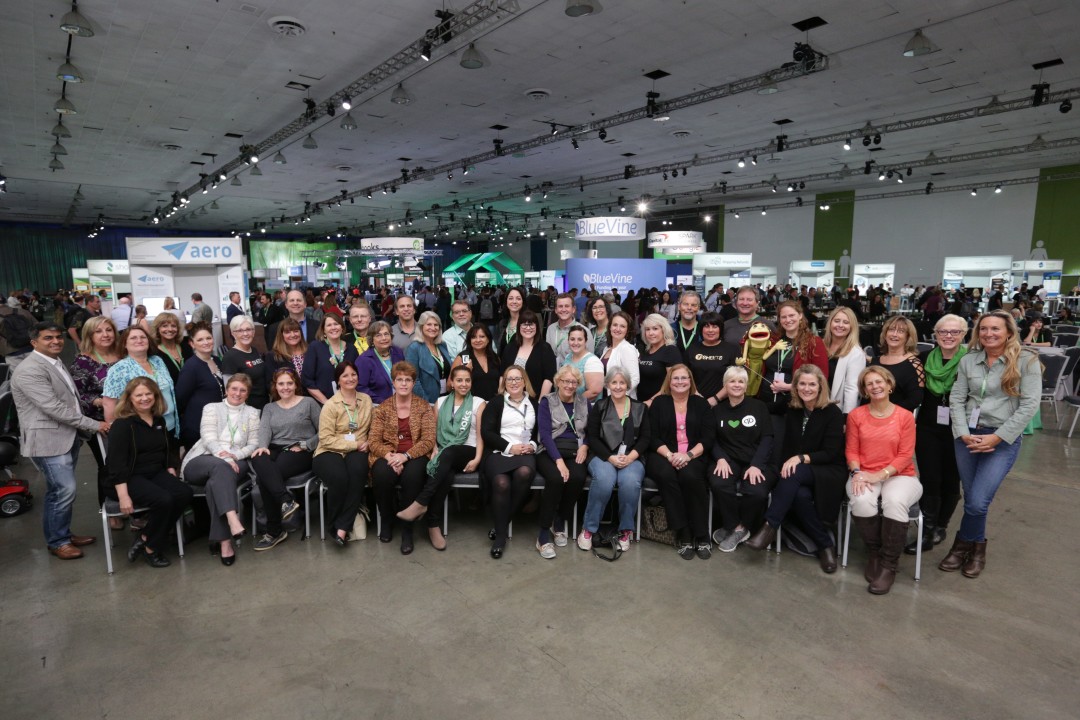 Some of the members of the Intuit Trainer/Writer Network, at QuickBooks Connect in 2016
Some of the members of the Intuit Trainer/Writer Network, at QuickBooks Connect in 2016
Alison Ball: And B to B is all about expert thought leaders. It’s experts, it’s showcasing experts and helping them explain concepts and go deep on things that people want to go deep on in service to selling or adopting a product.
Heather Smith: Yeah.
Alison Ball: So that’s what it is. Rarely did we just have somebody in an ad campaign saying, “Buy QuickBooks.” It wasn’t that way, and I certainly won’t be doing that with Liscio. Buy Liscio. It’d be like no, instead we’re going to educate people on the challenges and the problems and help them. No matter what, regardless if they use the product or not, we’re going to teach them something and they will come away bigger then they entered that particular activity. We’re going to make it worth their time. I mean nothing is worse than going to a conference and just realising at the end that it was just a complete waste of time. However, compare that with you go to a conference or an experience or you watch a video, read a blog, whatever, and you think afterwards, “That was a fantastic use of my time.” When you do that, when you think that was a fantastic use of my time, probably an influencer was involved.
Heather Smith: Yeah, yeah, absolutely. Absolutely, I completely-
Alison Ball: I kind of went a little bit roundabout but does that kind of explain or is there anything you want to go deeper on in that?
Heather Smith: It’s interesting that some people have a bad connotation about influencers and I think that they’re coming at it from the wrong angle and I think you did a really great job of explaining it. For me the weird realisation is that I was doing that was in Australia you have junior school and you have senior school, so you just have two levels, junior and senior school. It might have changed slightly since then, junior and senior. And the moms at the junior school came out to me and said, “Where are you sending your child for senior school?” And multiple moms did, and then we got to senior school and the moms were there, and I was like, “Oh hi.” And they’re like, “Oh, we chose the same school as you because we knew you would do all the research and work out the best school.”
Alison Ball: Oh so you were a school influencer. You were a school choice influencer.
Heather Smith: And I had. I had interviewed all of the headmasters, I’d assessed all the schools and I was like, “Oh my God, I’ve just influenced you to spend… Because it was a private school, it was tens of thousands of dollars, and it wasn’t… They never told me that that was what was happening. Yeah, so that was like-
Alison Ball: So the nice thing here is that there was a number of things that actually happened in that interaction, Heather. They would have to first of all see you as a credible source. They would then have to trust that you were going to do the right thing for your own child.
Heather Smith: Yeah.
Alison Ball: Probably obvious that you were going to do… However, some parents don’t. They may choose for different reasons, right?
Heather Smith: Yes.
Alison Ball: So there’s a lot there that is interesting. Then I think the third thing was is that they would probably rely on you… This goes back to trust but it’s a little bit of a different angle. They would rely on you to say when something wasn’t right.
Heather Smith: Yes, yes.
Alison Ball: So it wasn’t like you were just giving the good news, you would probably give the very balance. You’d be like, “Well on the one hand it was this, on the other hand, it was this, and I chose because.”
Heather Smith: Yeah. Yeah, absolutely. And I’m not a massively pushy parent and it was the other parents who were keen, but not massively pushy. There were schools if you wanted your child to be the number one in the world, well there were other schools, but I wasn’t interested in that. But yeah, no that’s… You’ve analysed it very well.
Alison Ball: You started out being an influencer very young, yeah.
Heather Smith: Well it was just like, “Oh my God, I influenced them to spend all that money.” I just was actually quite shocked about that. So for people listening in, both being accountants, bookkeepers, and in the app community, what activities would you suggest they undertake if they’d like to be seen as an influential thought leader?
Alison Ball: Oh I love this one. There are so many things you can do. So I think of the 70/20/10 rule, so 70% sharing knowledge, educating, sharing knowledge. 20% sharing other people’s knowledge, so you give shout outs and retweets and links to other people’s knowledge, and then 10% selling. The 70/20/10 rule just is really just a rule that you use really just kind of overall for content marketing, and the best content marketing is done, especially if it’s done with any kind of a brand behind it and not just an accounting firm, maybe you’re working with a brand, they’re paying you, and it’s good for you because… I’ll get to that in a minute because that’s a little different concept. But the idea of content marketing always has an expert point of view, and always teaches and educates.
Alison Ball: Depending on what part of the funnel, the marketing funnel that this content marketing is done at, it’s either a big awareness play where just getting people to understand that they have a problem, just get them to think about the problem, the challenges that they have, or it could be like, “Oh, I know I have a problem now, how do I learn more about that problem?” The best kind of content marketing gives tips that you don’t even have to use the product. Then after the sale is closed and that person is a customer, then there’s this retention marketing which also comes into play for content marketing because you want to educate them and keep the customers involved. So depending on whether you’re trying to build your own name for your own purposes or in service to something else, that’s the other thing, define your objective.
Alison Ball: So for example, someone could right now be working at a company but really want to develop their speaking, their side speaking engagement gigs. If that wasn’t a direction that somebody would want to go then I would say, “The thing that you need to do is you need to get onto other people’s, you need to prove it, you need to put in the work and prove it that you know about the topic, become that expert, become that go-to person.” So sometimes you can just call somebody up and say, “Hey, you’ve got a conference next year, when are you accepting papers?” Just make sure you know when people are accepting the papers. QuickBooks Connect, we were always about six, seven months ahead, and there was a call for papers and people would put in their topics.
Alison Ball: You can do guest blogging, that’s a really good one. Gets your name out there. You can do podcasts like this, this is fun. I don’t know, you might have a deluge of people asking you to be on your podcast after this. You can also gather people together for discussions. So if you’re all aligning around a similar topic then get people together and start a conversation about it, see if they’re there for you to collaborate on content together. But the idea is you’ve got to have some expertise and passion.
Alison Ball: You’ve got to actually have something that you’re passionate about, a topic, and you need to have some expertise in that topic because what’s going to happen is if you’re not an expert and you get up there and you sort of talk about these things, murder quickly outs. It does. People are sitting in the audience thinking, “Well I know a lot more than you do.” So you want to make sure that you know you’re stuff. The great thing is that every single accountant, bookkeeper, tax person, apps person, they’re all experts, they’re all experts on their own little niche of something.
Heather Smith: Yeah.
Alison Ball: And when I was advising accountants and bookkeepers all those years, what I would say to them is, “If you want to think about what content you should be creating, the best source of content is what questions are your clients asking you?”
Heather Smith: Yeah.
Alison Ball: Start with that.
Heather Smith: Right, and then blog about then, answer them in details.
Alison Ball: Exactly, exactly. And then the rest is just tactic, so it’s kind of like the what and the how. What is your expertise? The how is how are you going to get it out there? Oh, I should mention that Misty Magia, who used to be at Intuit, she led the ProAdvisor programme, she has a company called The Theatre of Marketing.
Heather Smith: Okay.
Alison Ball: And The Theatre of Marketing bears checking into because what she does is she helps people figure out their external personas and how they want to get it out there. So she does exactly what you just asked me. If someone wants to become an influencer and she can help you get there.
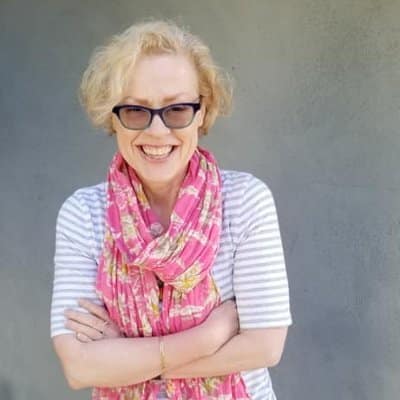 “The art is to keep the humans happy, while the science is in the strategy, sequencing, and measurement.” – Alison Ball, Liscio
“The art is to keep the humans happy, while the science is in the strategy, sequencing, and measurement.” – Alison Ball, Liscio
Now can I clarify your rule? Was it 70% sharing knowledge, 20% sharing other people’s knowledge, and the 10% sampling?
Alison Ball: Selling.
Heather Smith: Oh selling, okay.
Alison Ball: Yeah.
Heather Smith: Oh I didn’t understand it.
Alison Ball: Sampling might work too. I don’t know if you were a musician you’d sample other people’s music. Yeah selling, yeah the reason is is that a lot of people when they… You know the people that don’t do it well. They’re always talking about themselves on their social handles and they don’t tend to have a lot of followers or become influential because what they’re saying is not interesting.
Heather Smith: I take great joy in surfacing people’s voices. So I know that.
Alison Ball: There you go, right?
Heather Smith: … a lot of people will know you so I don’t necessarily think that this interview is like, “Wow, very exciting for me to have,” but finding someone who has a quiet voice and just being able to surface that and pull some amazing information out of them, I take great joy and pride in that.
Alison Ball: Yeah, it’s a gift that you can help them share with the world.
Heather Smith: Yeah, yeah, yes.
Alison Ball: Everybody is an expert in something and it’s just a matter of being… Everybody is, and it’s just a matter of getting that… As I said, packaging it up really and getting it out there.
Heather Smith: And especially in the accounting and bookkeeping world. Sometimes a lot of us are quiet, and so actually hearing from another quiet person it really resonates with them and the ripple happen and it doesn’t need to be massive… It doesn’t need to go viral for it to be a successful type of thing.
Alison Ball: No, and actually that’s the other thing I want to make a point about. B to B influencers don’t tend to have 50, 100, 200, a million followers, they don’t. They’ll have up to 5,000 or up to 10,000 followers, but that said, the people that are following that thought leader are going to do what they say. They’re going to be heavily influenced because that person has proven that they have good things to say, that they’re worth listening to. It’s just a smaller pool, so if people are looking for an influencer to work with, followership is not what it’s… Personally I don’t even look at it. What I do look at is, of the people who follow them, how many are engaged?
Heather Smith: Yeah, yes, yes the engagement is very important. So in terms of that, the next question leads on very well, and I find that this is incredibly difficult but maybe you’ve got something insightful to share here. What metrics do you use to measure the effectiveness of community building and influencer marketing?
Alison Ball: Well so influencer marketing, once it actually becomes a marketing tactic, you have all of your normal… You have your impressions, like how many people could have seen it, you have your clicks through to whatever landing page you want to send them to, you have your download rate, you have your lead capture, so the normal metrics will apply when you’re actually doing content marketing as a marketing activity. If you’re building a community though, as a means to build your influence, I would look at a couple of things. You’re definitely going to want to monitor how many people are joining, so how many people are actually interested in joining your community. How many people are leaving your community? If people join and then they leave they did not see the value, so you’ve got some work to do. Then, of course, you would want also, as I said, the engagement, what is happening? Are you just putting stuff out there and nobody’s… people are looking at it but they’re not commenting? So again that means you’ve got some work to do to build your engagement.
Alison Ball: I think the community starts to take a life of their own when members start contributing and adding content in addition to asking questions and commenting on your own stuff.
Heather Smith: Yeah, yes, yeah.
Alison Ball: And you’ll know you have it, you’ll know you have a good community when you need help. You’ll be like, “I am spending six hours a day on this community, I can’t get my work done.” Then you start bringing in people to help you moderate, right?
Heather Smith: Yeah. It is surprising how much work… It’s like the iceberg, there’s a lot of work behind the scenes into building an organic, lovely, interesting, thoughtful community.
Alison Ball: Mm-hmm. So, when people do it, Heather, they should always have an objective in mind because it’s really easy just to do something fun like I used to call it the attract of many versus the critical few.
Heather Smith: Yeah.
Alison Ball: And so especially if you’re a smaller operation. Now if you have the luxury of having the title Community Manager, that’s your job.
Heather Smith: Yeah.
Alison Ball: That is your job and you’re going to be all in, that’s your job to do it all day. However, most people, especially in the accountant and bookkeeper space who are thought leaders, their community is usually a means to an end. And they do it so that, for example, they’ll get more speaking gigs or they’ll sell more books or they’ll have people sign up for their course that’s a paid course. So there’s usually some path to monetisation usually, that then creates the community to be a self-sustaining thing because it’s good for them to spend that time because it’s in service to this success metric at the end, which is more signups, more speaking gigs, more blog subscribers or whatever.
Heather Smith: Yeah, absolutely yeah. Look, one of the things for me in creating a community was being a solo person. It was a means for me to tap into the brains of people that if I was to tap into it would cost me… Like you know I see conversations that would cost me $1,000 to actually have and it’s like bam. Hopefully, that helps a lot of people move along and I think like Kelly Waters, who has The Water Hole, she has a similar type of community in the US of A, and it helps people move along. There’s hundreds or thousands of dollars worth of consulting happening for free.
Alison Ball: Oh yeah. Oh it happens for free and that’s what’s really amazing, and then you get also this thing called… Have you heard the term the adjacent possible?
Heather Smith: Oh no.
Alison Ball: So the adjacent possible is fascinating. The idea is you put people together, and it could be a virtual room, a Facebook community is a perfect place to put these people together, and then you see what happens when they all start engaging and they create… The sum of what they create is much more than the single parts alone. They start creating things that are adjacent to the normal thing that you wouldn’t have thought were… you wouldn’t have dreamed. So for Kelly to create her watering hole, it’s an interesting thing because she actually didn’t start out to do that and now she’s got these people in and now her community is starting to take a life of its own and things are starting to be invented and happening and it’s starting to be very exciting.
Heather Smith: Yeah, absolutely and she’s starting to put up resources and she’s putting up… She’s very process-orientated so she’s putting resources up there that can support the community and living and breathing.
Alison Ball: Mm-hmm.
Heather Smith: So thank you so much for being on the show, really enjoyed having you here. I feel like I’ve had a masters class in community influencer marketing and I could talk to you for a lot longer. So I’d be keen to know what’s next for you, can our listeners get involved in our ebook project if possible? I don’t know.
Alison Ball: Yeah, so the ebook right now what we’ve done is we’ve already closed the… So the next one, what I’ll have to do Heather is I’ll just have to send the link and then have you send it out.
Heather Smith: Yes.
Alison Ball: Because I’m going to be leaning heavily into the expert community to deal with the challenges and the issues that our best prospects at Liscio are facing. To educate, to flush out what… Just to understand more about the problems and the challenges and get solutions, as I said, from that broader community.
Heather Smith: Yes.
Alison Ball: So I will definitely let you know, and I also will let you know when the ebook is published because I’ll just send it out and you’ll be able to download it.
Heather Smith: Yes, absolutely.
Alison Ball: It’ll be free and people can… And you’ll recognise some of the names in there.
Heather Smith: Fantastic.
Alison Ball: Definitely yeah, but that was a very quick hour. I can’t believe that went so fast.
What’s your next two to three to four to five years looking like? Do you know that? Can you talk to that?
Alison Ball: Oh yeah, well Liscio is a three-year-old company and they’re really just hitting their stride, so I think what’s going to be happening is, and I was really clear with Chris Farrell, the co-founder, I was really clear with him that it’s really important that I be able to fall in love with the company that I join. The job search was really interesting for me because I had all sorts of different opportunities where I could have gone to an agency, for example. And I thought, “Well an agency would be super interesting because I’d get to deal with different clients,” but it didn’t meet that ‘could I fall in love?’ test. Could I really fall in love, could I really get to know the clients, could I really understand the problem, could I really go deep?
Alison Ball: And so and that was the gift that Intuit gave me was that I really could do that and then just kind of keep morphing and once you sort of solve one thing I kind of would invent my next role at Intuit and I just did that for 15 years. I don’t think 15 years but five for sure. I wouldn’t be surprised if in five years we’re still talking and I’m still at Liscio.
Heather Smith: Excellent, yeah.
Alison Ball: But it will be very different, my role will be different.
I feel very much that community’s about love and it’s hard to define it because it is love and how do you define love?
Alison Ball: It’s a feeling and you know it’s right.
Heather Smith: Yes.
Alison Ball: You know when you have it, yeah.
Heather Smith: Yes. So thank you so much, Alison. I’m so happy to have you on the show, for joining us and sharing so many insights with us. How can our listeners get in touch with you and when you shoot me across the link I’ll put that in the show notes as well.
Alison Ball: Yeah, so Twitter’s probably easiest, it’s just @iamalisonball and Alison has one L, so that’s the only tricky thing. So I-A-M-A-L-I-S-O-N-B-A-L-L. If they want to see my urban farming, which is kind of fun it’s alisonhavingaball but underscores in between each thing alison_having_, but that’s completely different, that’s if you want to nerd out with vegetables. Then of course LinkedIn I’m super easy to find. Then Liscio has an interesting last two digits on, it’s not Liscio.com, it’s Liscio.me, M-E, so my email is alison@liscio.me, but Liscio means delight in Italian.
Heather Smith: Oh okay.
Alison Ball: So it’s Alison at delight me, which I love. I’m like I love that. I’m just like okay. We’ll do that.
Heather Smith: Is the founder Italian?
Alison Ball: No, no I still don’t know the story yet of where the name came from, but I love it. I think it’s got these… It also means smooth, it means swimmingly, it has all these different things, but there is this connotation of delight, which I love.
Heather Smith: Which completely aligns with the customer 2.0 experience, doesn’t it? Smooth, swimmingly, delightful, joyful.
Alison Ball: That’s right.
Heather Smith: Thank you so much, Alison.
Alison Ball: Yeah. Well, this has been a pleasure, and please let me know what I can do for you Heather because this has been so much fun.
